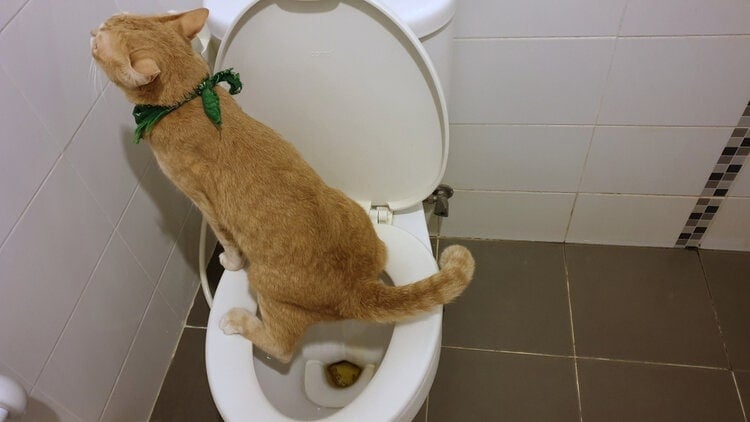Why Flushing Cat Poop Down Your Toilet Is Harmful - Suggestions for Proper Disposal
Why Flushing Cat Poop Down Your Toilet Is Harmful - Suggestions for Proper Disposal
Blog Article
Just how do you actually feel about Don’t flush cat feces down the toilet?

Intro
As feline proprietors, it's important to bear in mind exactly how we throw away our feline good friends' waste. While it might seem practical to flush cat poop down the commode, this technique can have damaging repercussions for both the environment and human health.
Ecological Impact
Purging cat poop presents dangerous microorganisms and parasites right into the water system, posing a substantial danger to aquatic ecological communities. These contaminants can adversely influence aquatic life and concession water high quality.
Health Risks
In addition to ecological issues, purging cat waste can likewise pose health and wellness threats to humans. Feline feces might contain Toxoplasma gondii, a bloodsucker that can create toxoplasmosis-- a potentially serious health problem, particularly for pregnant ladies and people with damaged body immune systems.
Alternatives to Flushing
Thankfully, there are much safer and a lot more liable means to dispose of cat poop. Think about the complying with options:
1. Scoop and Dispose in Trash
The most typical technique of throwing away feline poop is to scoop it right into a naturally degradable bag and throw it in the trash. Be sure to make use of a committed clutter inside story and throw away the waste immediately.
2. Use Biodegradable Litter
Opt for biodegradable pet cat trash made from materials such as corn or wheat. These clutters are environmentally friendly and can be safely taken care of in the garbage.
3. Bury in the Yard
If you have a backyard, think about hiding feline waste in a designated location away from veggie gardens and water resources. Make certain to dig deep sufficient to prevent contamination of groundwater.
4. Set Up a Pet Waste Disposal System
Buy an animal garbage disposal system specifically created for cat waste. These systems utilize enzymes to break down the waste, lowering odor and environmental effect.
Verdict
Responsible family pet possession expands beyond offering food and sanctuary-- it additionally entails proper waste management. By refraining from flushing feline poop down the bathroom and going with different disposal approaches, we can minimize our environmental footprint and protect human health.
Why You Should Never Flush Cat Poop Down the Toilet
A rose by any other name might smell as sweet, but not all poop is created equal. Toilets, and our sewage systems, are designed for human excrement, not animal waste. It might seem like it couldn’t hurt to toss cat feces into the loo, but it’s not a good idea to flush cat poop in the toilet.
First and foremost, assuming your cat uses a litter box, any waste is going to have litter on it. And even the smallest amount of litter can wreak havoc on plumbing.
Over time, small amounts build up, filling up your septic system. Most litter sold today is clumping; it is made from a type of clay that hardens when it gets wet. Ever tried to scrape old clumps from the bottom of a litter box? You know just how cement-hard it can get!
Now imagine just a small clump of that stuck in your pipes. A simple de-clogger like Drano isn’t going to cut it. And that means it’s going to cost you big time to fix it.
Parasitic Contamination
Believe it or not, your healthy kitty may be harboring a nasty parasite. Only cats excrete Toxoplasma in their feces. Yet it rarely causes serious health issues in the cats that are infected. Most people will be fine too if infected. Only pregnant women and people with compromised immune systems are at risk. (If you’ve ever heard how women who are expecting are excused from litter cleaning duty, Toxoplasma is why.)
But other animals may have a problem if infected with the parasite. And human water treatment systems aren’t designed to handle it. As a result, the systems don’t remove the parasite before discharging wastewater into local waterways. Fish, shellfish, and other marine life — otters in particular — are susceptible to toxoplasma. If exposed, most will end up with brain damage and many will die.
Depending on the species of fish, they may end up on someone’s fish hook and, ultimately on someone’s dinner plate. If that someone has a chronic illness, they’re at risk.
Skip the Toilet Training
We know there are folks out there who like to toilet train their cats. And we give them props, it takes a lot of work. But thanks to the toxoplasma, it’s not a good idea.

We hope you liked our piece about How to Dispose of Cat Poop and Litter Without Plastic Bags. Thank you for taking the time to browse our short article. Remember to take the time to share this page if you enjoyed it. Bless you for your time. Please come visit our blog back soon.
Get A Quote Report this page